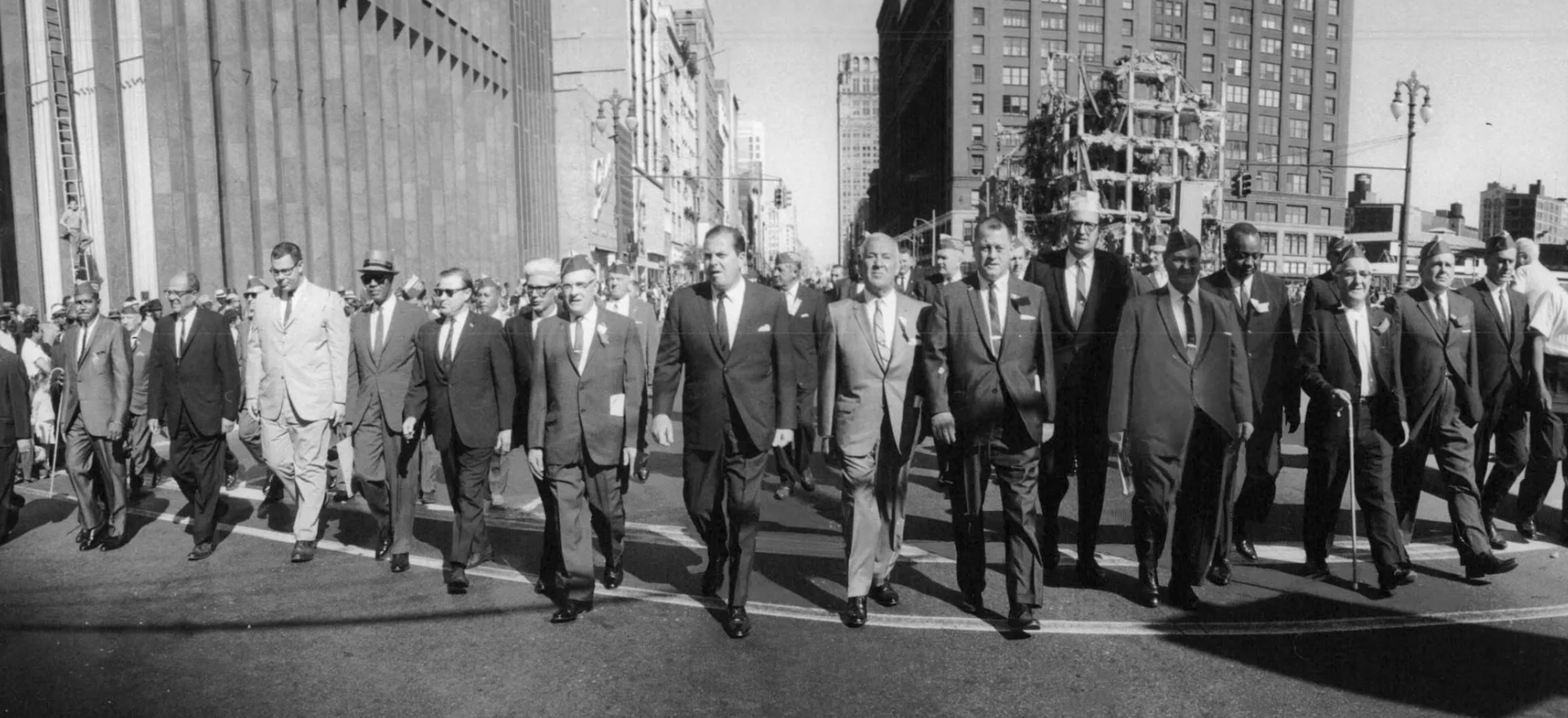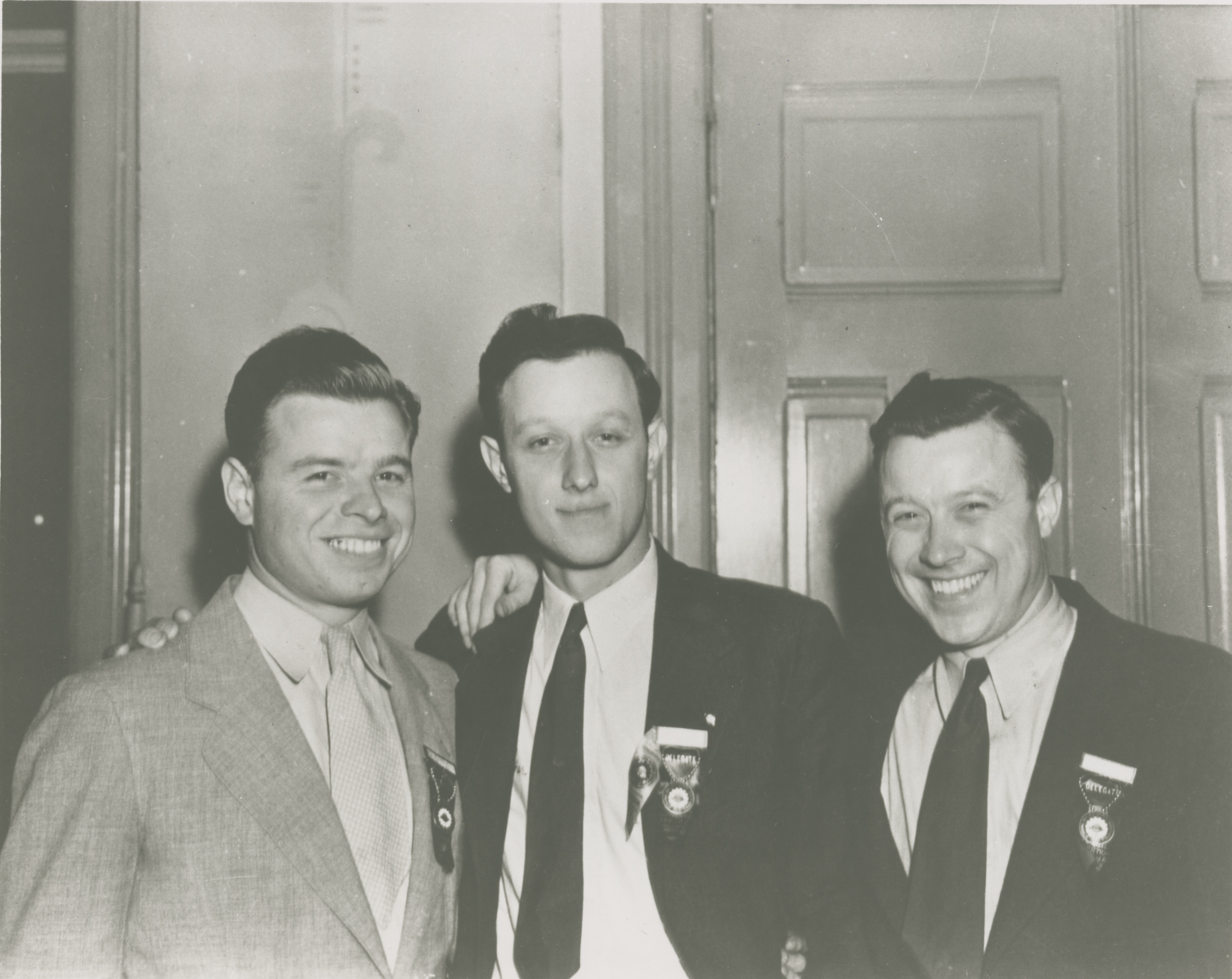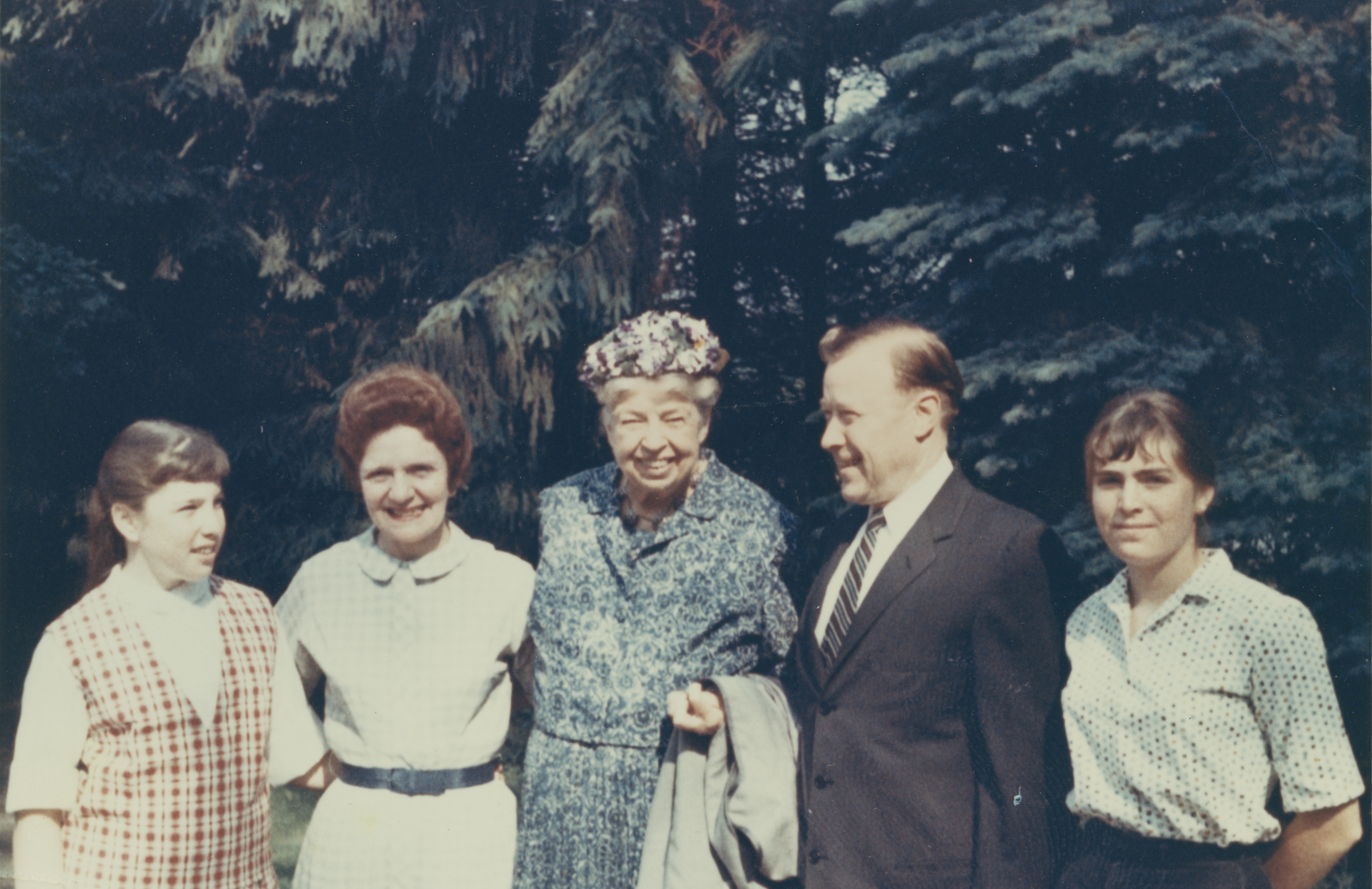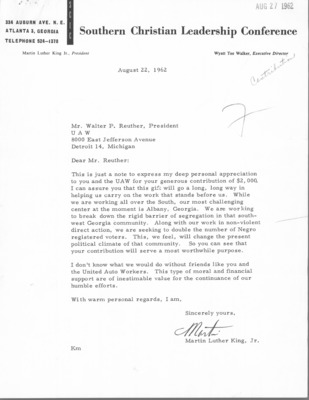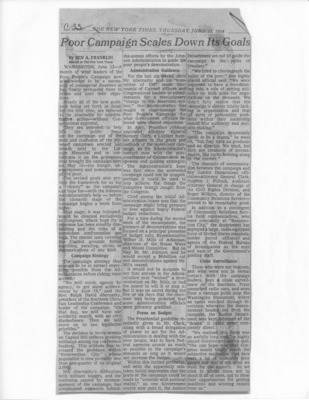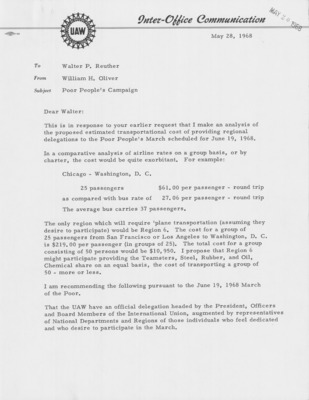UAW Solidarity
Item
- Title
- Date
- Alternative Title
- extracted text
-
UAW Solidarity
-
1962-09-01
-
Vol. 5 No. 9
-
Le
INTERNATIONAL
UNION,
UNITED
On Aerospace Negotiations
President John F. Kennedy Answers a Question about
Aerospace Negotiations at a News Conference, Sept. 13:
sc. . . Most major industrial companies or industries
in the United States have accepted the union shop many
years
ago
—
the
steel industry,
the auto
industry,
the
aluminum companies, other basic industries — the union
—
the
t’s
Tha
»
«
.
ng
ni
ai
rg
ba
e
tiv
lec
col
of
t
par
is
op
sh
first point.
it
e,
ag
ck
pa
al
tot
the
t
tha
is
nt
poi
nd
co
se
the
“Now,
e
Th
e.
ag
ck
pa
a
as
ed
er
id
ns
co
be
ld
ou
sh
seems to me,
me
co
ey
Th
.
ive
ess
exc
not
are
de
ma
s
al
os
op
pr
ic
econom
well within the guidelines suggested by the Council of
Economic
Advisers.
“The Unions
are accepting a financial settlement
which is not particularly generous in relation to certain
other unions in recent years. They feel that the total
package,
JUST AFTER he announced that UAW and the giant North American Aviation Co. had reached agreement in principle on a new
contract, President John
F. Kennedy
chats
informally
in
his
office with officials of the UAW, the aerospace company, and
the federal mediation service. (Story, identifications on Page 3.)
President
Aerospace
‘“‘T am pleased to announce
Aerospace Workers (UAW)
that the United:
and North Ameri-
can Aviation, Inc. have reached an agreement in
principle on all the remaining issues in dispute
of the
the recommendations
upon
based
President’s Aerospace Board. . . .
“It is gratifying that both parties in the dispute
were able to alter their positions sufficiently to
bring about a mutually acceptable agreement on
however,
is
acceptable.
‘¢, . - I would hope that the companies would accept
it because if there is a strike the responsibility would be
very
clear,
I think,
to the
American
people
for
an action.”’
nnounces
ettlement
the principles for a new contract. Unquestion<
ably, they have served the public interest by
insuring
continuous
production
of
aerospace
equipment at the facilities. .. .
“I strongly urge the remaining companies and |
unions still negotiating in this industry to display
the same sense of responsibility to the public
interest.’
—President
John F,
Kennedy,
Sept.
19,
1962
such
O
Ts
CUVvUNi
ay
Lc
tHEn"
_
a
-
Sue
3G
aide
was
NOTLIGGV
Speaks Ou
President ea
*
+
SOLIDARITY
September 1962
SCOOMMOGVHS
664
r
ns
9
LF
Ni
No.
T
Fs
10
bed
é
¥
5
Pe
Vol.
Retrained Member’s New
Job
Spotlighted by President
UAW member George DeMartz didn’t hear President Kennedy mention
his name and his job in a broadcast to the nation, but he knew about it.
It happened last month when the President told of the importance of the
manpower retraining bill backed by his Administration and the labor moyement and passed by Congress.
HAZLETON, Pa.—A UAW
was retrained for a new job
program was mentioned by
John F. Kennedy when the
retraining in a nation-wide
member here who
under a new federal
name by President
latter discussed job
telecast last month.
to him for
his family.
“Our
the
welding
before the telecast and informed
latter’s name would be mentioned
address
them that the
in the address.
DeMartz was selected by the Department
Labor through the local office of the Bureau
Employment Security.
to
Kennedy related that thousands of Americans had to be retrained for new jobs in order
to support. their families. In reference to DeMartz, the nation’s chief executive said:
of
of
His name was submitted by Joseph Garrity,
local office manager, because DeMartz was typical of many American men who couldn’t find
a job in the coal mines.
“In Carbon County, Pennsylvania, 53-year-old
George DeMartz could no longer—and this is
true of many men in Kentucky, West Virginia
and Illinois—find
new
Secretary of Labor Arthur Goldberg telephoned Highway Trailer plant officials and DeMartz
he re-
school.
him
Jack Mundie, general foreman at the plant,
explained that DeMartz was one of his best
workers, despite the fact that he has been on the
job for only a month and had to be retrained.
The President explained that after DeMartz’s
attend
taught
support
DeMartz did not hear the President’s
because he was at his job at the plant.
President Kennedy cited DeMartz, father of
five children, as a typical American worker who
knew only one skill—that of coal mining—and
was retrained under the federal program for
a new skill.
ceived benefits for 16 weeks while training.
DeMartz was selected Feb. 5 of this year
program
him
islative actions have served a purpose, the pur~
pose of jobs and growth to strengthen the economy of the nation and refusing to be satisfied
with status quo.”
a job as a welder at Highway Trailer Inc., whose
employes belong to Local 1026.
exhausted,
help
“All these strands of administrative and leg-
As a result of this training, DeMartz obtained
were
retraining
to
development office has him again fully employed tonight on the night shift.
program and with the cooperation of the Pennsylvania Department of Labor and Industry and
the State Department of Public Instruction.
benefits
months
skills as a welder-and a trailer company newly
located in. Pennsylvania. through our Area Re-
Singled out by the President was George DeMartz, 53, now a member of UAW Local 1026. A
former coal miner, DeMartz was retrained as a
welder at the Hazleton Vocational School as part
of the Federal Area Redevelopment Assistance ©
unemployment
three
A
“Last November his unemployment insurance
benefits ran out. Federal benefits were extended
began full time employment
AMERICAN
worker
trained under the new
His wife, like many other women in the anthracite region, had to go to work to support the
family while the man stayed home and handled.
the household chores.
Like many other men in this area, DeMartz
a job in the coal mines.
TYPICAL
who
was
re-
federal retraining pro-
gram—that’s what President Kennedy said of
George DeMartz (above), member of UAW Lo‘eal 1026.
A former unemployed coal miner,
DeMartz was retrained as a welder and is now
doing very well on his new job. (Photo courtesy
at an early age—14.
Hazleton
Standard-Speaker).
“St
Impressive Start for Long-Awaited
Retraining Program for More Jobs’
The Kennedy Administration is moving fast with its new manpower retraining program, aimed at fighting unemployment—especially long-term joblessness. The program’‘s
accomplishments thus far and its importance are stressed by W. Willard Wirtz, named by
President
economy.
When he signed the bill, the President said, “It is perhaps the most
significant legislation in the area of
employment since the historic Employment Act of 1946.”
in anWirtz,
Secretary
Acting
of training
number
the
nouncing
projects said:
“This is an extremely important
unemployattack on the Nation’s
ment, especially long-term unemployment. This is not to be training for
training’s sake. It is training with a
workers
In all, 237 projects have been sub-~
-mitted to the Labor Department from
34 states for apropval. They would
living in 113
12,221 workers
train
different
in 71
areas
The Act, signed
nedy last March
succeed
workers who are denied employment
or who face unemployment because
they do not possess skills required by
the
Nation’s
constantly
changing
To date, a total of 70 projects in
11 States to train workers in new jobs
Development
Manpower
the
under
and Training Act has been approved.
2,437
to
train over the next three years hundreds
of
thousands
of American
WASHINGTON—Manpower retraining, a program successfully sought by
Kennedy
the
and
labor
organized
Administration is off to an impressive
start, according to Acting Secretary
of Labor W. Willard Wirtz.
The projects will train
in 29 occupations.
Kennedy
occupations.
by President Ken15, is designed to
Before
purpose.
any
project
is
Arthur
Goldberg as U. S$. Secretary of Labor.
ap-
their present skills, Acting
Secretary Wirtz said.
Pennsylvania has had
a
D
f¥owt.
SOL (0) /A\
By
eS
<f
ye
United
Automobile,
projects
31
ers are Indiana and Wisconsin
Colorado
four approvals each.
three and two projects have
with
with
been
paid
at
Indianapolis,
Ind.
St., Indianapolis 7, Indiana,
Frank
;
Winn, Editor and
:
oe and
Public
Published
to members, 60c; to non-members, $1.00.
Pub- “
De
Director,
lati
Relations
:
monthly
at
2457
E.
WALTER
.
ets
J *e : Walsh, : Assistant
rn
ae
and
Public Rela ons
Gcdibare
Henry
and
Santiestevan,
Managing
Director,
Assistant
Editor
Publications
and Public Relations Department.
Dale,
oe
ae
Dep.
American
Newspaper
:
Guild,
Vice Presidents
GOSSER
RICHARD
LEONARD WOODCOCK
Alpert,
Ray
Jerry
Martin,
Members.
Bernard
Hartford,
George
Bailey,
Howard
Ryder,
Jerry
Lipton,
Staff
SOLIDARITY,
September,
On
the
reverse
:
side
of this
page
:
is a label
:
to this form
:
in space allotted and fill im form and mail to
UAW Solidarity, 2457 E. Washington St., Indi-
p
Nelson Jack Edwards
Douglas
Fraser
Martin
Gerber
Ted Hawks
Robert Johnston
wie
Charles
Harvey
Joseph
Kerrigan
Kitzman
oo
eee
Ken
George
Pat
ES
:
intend
.
to move,
anapolis 7
.
:
;
:
7
If this is not correct, or if you
please
affix
@
label
sar
ma.
.
.
:
.
"
*
PLEASE
es
:
"
:
':
:
:
O'Malley
®
Pattersan
.
Schrade
:
+
:
Merrelli
:
:
s
.
in this area
=
;
s
Affix label from your paper
«
Morris
te
number.
®
and local
name, mailing address
; with your
:
=
=
Paul
1962
a
aw
ADDRESS?
DIFFERENT
=
Local
Union
SSCHSSHHHSSOSHHHOHSTHOHTHOHHHSHHHHSEHE
New
:
:
e
SCSCHOSERSESHCHSHHOHETHOLAHHHORHHOHSHHOSTTORAHH
Name
ee
RR
,
ives
sneticciswsccticaseaics
Den U REO RUO NUR RRC RRR
SEH LETCESHALC
SER TLCETE SEE HEESED
ZONE,
SHS
.
:
"
Address
:
2—_UAW
REECE,
Ray Berndt
George Burt
Bard Young
Page
SHREK
unon
Wee
AFL-CIO
SS
;
PAT GREATHOUSE
Members,
®
Mkuanke
air as aren
3
Simon
P,. REUTHER
RECEP
Charles Ballard
Ken
Bannon
:
President
Washington
TERE
’
.
TEB Members
oe
trol 14, Michigan. Yeatly subscriction
St. Indianapolis 7, Ind. Second class postage
KEKE
=
and Agricultural Implement Workers of
instructraining
and _
equipment
facilities,
tional staff for vocational
courses.
=
.
to 2457 E. Washington
testing and placing trainees. State
will
agencies
education
vocational
develop courses and provide training
i
=
Aerospace
POSTMASTER: Send Form 3579 attached directly under mailing label
State employment services have responsibility for selecting, counseling,
for training okayed in nine areas of the
State. Michigan has had.11 projects
approved and Maryland seven. Oth-
OFFICIAL PUBLICATION, International
Union,
States have requested training in a
variety of jobs including auto mechanics, nursing, Office work, electronics, drafting, welding, sheet metal
woodworking,
working, painting,
bookkeeping, service station attendant, waitress and salesman,
The Act authorizes the Secretary
of Labor to approve agreements with
states to conduct training programs.
ogy. It also is aimed at qualifying
for employment persons who could
not be expected to obtain full-time
jobs with
:
Texas.
Act seeks to provide. trained manpower to meet the Nation’s requirements in an era of unusual labor
force. growth and complex technol-
QPCR
ROK
approved for Rhode Island, MississipCarolina and
South
pi, Oklahoma,
proved, there must be a reasonable
assurance that there will be a job
waiting for the worker when he com:
pletes his training.”
Through research and training, the
:
ETA
HSEeREeFecsggneeesshoseseoesgeass®H
.rcccce
BLO
LC.
icscivccnseseid
.
a
‘
“
“
RERUN
JFK Announces New
Aerospace Agreements
contract bargaining,
1960 aerospace
the UAW and IAM teamwork began
reaching fruition again this year with
the pace-setting agreement by the
two unions with Douglas Aircraft (see
SOLIDARITY for July, 1962).
In that contract, the unions won the
agency shop under which non-members pay the equivalent of union dues
to the union which is required by law
to represent both members and nonmembers alike.
The agency shop breakthrough by
UAW and IAM at Douglas clearly led
to the open shop now being made
Significant
WASHINGTON — A
agreement in principle for a new con-
and the giant
tract between UAW
has
Co.
Aviation
American
North
here by President
been announced
John F. Kennedy.
In an unusual action of announcing
the settlement from the White House,
President Kennedy said the agreement
in principle “unquestionably” showed
a sense of responsibility to the public interest.
He noted it was based on recommendations of his special aerospace
fact-finding panel to look into issues
To North
Published
American
American
information
Aviation,
"I TOLD YOU HE WAS ANTI-BUSINESS ..!
Members:
Aviation
concerning
with
North
language,
which
settlement
the
Inc., falls considerably
short
many changes, both in economics and contract
have resulted from the current negotiations.
in describing
the
A full explanation, setting forth the details of the agreement,
will be given to the membership at ratification meetings which will |
be scheduled shortly. Meanwhile, certain details are being worked
out at the boraaitas table.
LEONARD
WOODCOCK,
Director of UAW
which had been in dispute in negotiations with North American and other
aerospace firms.
The new three-year sbbuenietit pro-
vides:
@ General wage increases in 1962,
1963 and 1964;
@ Retention of cost-of-living protection;
@ Major improvements in hospital,
medical and surgical insurance
coverage;
@ Vast improvements in the ExPlan
tended Layoff Benefit
(ELB);
@e An additional holiday with pay;
® A union shop upon an affirmative vote by two-thirds of the
- employes voting in the bargaining unit;
s Significant improvements in the
contract and the working condition provisions.
Present for the White House announcement were union negotiators
headed by UAW President Walter P.
Reuther and Vice President Leonard
Woodcock, director of UAW’s National
Aerospace Department, company bargainers, and federal officials who had
been aiding in negotiations.
In his statement disclosing the set-
tlement, President Kennedy said the
UAW-North American settlement was
followed by another agreement, also
in principle, between the Machinists
Union and General Dynamics/Convair
at Long Beach, Calif.
The two unions—UAW and IAM—
had joined in drafting their collective bargaining program and coordinated their negotiations with aerospace firms to rev up the wages and
fringe
benefits
of
almost
300,000
workers covered by their contracts in
the industry.
Used successfully in 1956, 1958 and
Vice
Aerospace
President,
Dept.
Coast-based
West
in the
possible
aerospace industry, the last open-shop
mass production industry in that part
of the nation.
Following President Kennedy’s anfor UAW
negotiators
nouncements,
returned to Los Angeles.
and NAA
There, the union’s North American
Council, whose
President
out other
principles
chairman
is Local 887
Jack Hurst, was working
contract details under the
agreed to in reaching the
assisted by Woodcock.
settlement,
“The parties will continue to meet
for the purpose of translating the
agreement upon principles into spe-
cific and detailed contract language,”
President Kennedy said in announc~ing the settlement.
of
“The
parties have
completing
their
every
work
Gpectation
within
the
next few days and the old agreement
will continue in effect until the new
agreement is ratified by the union’s
membership.”
Meanwhile,
negotiations
still are
continuing with Ryan, Lockheed and
Boeing. Bargaining also is going on between UAW and Ling-Temco-Vought
at Grand Prairie, Tex., where Local
848’s members have set an Oct. 10
strike deadline.
Page
One
Photo
With the President at the announcement were, for the UAW,
President
Walter
P.
Reuther,
right, and Vice President Leonard
Woodcock, third from left; for
North American Aviation, J. D.
Starkweather, vice president, and
C. C. Cole, assistant to the president, and for the Federal Mediation and Conciliation Service, its
chief, Wm. Simkin. (UPI Photo)
President Points
In Aerospace Negotiations
WASHINGTON—When—a week before UAW’s crucial agreement in principle with North American Aviation
Co.—a reporter asked President Kennedy about the then-stalled aerospace
industry negotiations, the Chief Executive put the issues into clear per- spective for the nation.
for
Noting that recommendations
by the
settlement had been made
special aerospace panel he had ap-
pointed to look into issues in dispute
table, President
at the bargaining
Kennedy pointed out the outStanding
reputation of the three members of
the- panel which is headed by Dr.
George W. Taylor. The President explained that Dr. Taylor “was given
a comparable assignment by President Eisenhower in the steel strike
case which indicates his own high.
reputation and that of the panel.”
With the UAW
and IAM already
having agreed to accept the recommendations, the President said: “I
would hope that the companies would
accept
the
recommendation
because
_ if there is a strike, the responsibility
would be very clear, I think, to the
American people.”
Emphasizing that the fact-finders’
recommendations
“should
be
con-
sidered as a total package,”
Kennedy
told
the
press
President
conference:
“The economic proposals made are
not excessive. They come well within
the guidelines suggested by the Council of Economic Advisers.”
The reporter also had noted in his
were
that the companies
question
stubbornly holding out against the
union shop, even though the panel
had recommended this be put up to
a vote by aerospace workers.
President Kennedy had this
about the union shop issue:
“Most major
or industries
have accepted
years ago—the
industry, the
other
basic
to say
industrial companies
in the United States
the union shop many
steel industry, the auto
aluminum
companies,
industries.
“The union shop is part of collective bargaining, and particularly under
the terms suggested by Dr. Taylor—
a two-thirds vote—people do not have
to join the union to get the job.
“After they’ve come to work, if it’s
an opinion of a large majority of the
members, then they would join the
union. This has, as I say, been acceptable for many years to companies
which are even larger than the ones
that are involved.”
The need for public responsibility
had been dramatized to the nation.
And the issues were clear.
GOP-Dixiecrats Defeat
Jobless Pay Extension
WASHINGTON
Republicans
and
—
A
southern
coalition
of
Democrats
in the House Ways and Means Committee dealt a sharp blow to unemployed workers late last month when
they defeated by one vote a bill to
extend the federal temporary unemployment compensation program.
The bill had been.given strong support by the Kennedy Administration
and organized labor. The TUC program enacted last year expired April
1. The last benefits were paid July 1.
. The bill defeated in the committee
would have provided additional bene-
fits up
THE FIRST AWARD of the Walter Ranthes Scholarship Fund was presented
to 18-year-old Brenda Faith Miller by UAW Vice President Leonard Woodcock,
as her parents, Mr. and Mrs. Harry Miller, look on. The fund, established at
the UAW Convention this spring by the National General Motors Council, provides scholarships to Wayne State University in Detroit for children of members.
Brenda’s father is a member of Local 157, Fisher Body Plant 21 unit.
Issues
Up
to
13 weeks
for some
850,000
unemployed who have exhausted their
state unemployment benefits or are
expected to use up their benefits within the next six months.
A switch of only one vote would
have changed the result. Eleven Democrats and one Republican voted for
it; nine Republicans and four south-
ern Democrats voted against it.
Among the 12 supporting the
UAW
bill,
however, the lone Republican, Howard
W. Baker of Tennessee, was regarded
by political observers here as the most
doubtful supporter.
He
had
been
expected
to vote
against it, but when the Democrats
voted first it was obvious the supporters did not have enough votes
to pass it. Baker voted: for it after
it was certain his vote would not
change the final results.
Southern Democrats voting against
the bill were A. Sydney Herlong, Florida;
James
B. Frazier
Jr., Tenn.;
Burr P. Harrison, Virginia
W. Thompson, Texas.
and
Clark
Republicans against were Victor A.
Knox, Michigan; Noah M. Mason, IlliWisconsin;
Byrnes,
W.
John
nois;
Thomas
B. Curtis, Missouri;
James
B. Utt, California; Jackson E. Betts,
Ohio; Bruce Alger, Texas; Steven B.
Derounian, New York and Herman T,
Schneebeli, Pennsylvania.
SOLIDARITY,
September,
1962—Page
3
°
Yo
They're Ready to Vote—
Are You?
(Photo
*%
by
Iry
... The right to vote is very basic. Ii
were going to neglect that right, then all
is hollow...
freedom
about
talk
our
I hope everybody will register in this
—
country. I hope they will vote.
President
COPE
UAW Citizenship Dept.
Solidarity House
8000 E. Jefferson
Detroit
14,
Yes, I want
Mich.
to help. Here’s my
Dollar.
COPE
OL OOOOOCOS
Address
COCOSEE
OLEH
OOH
OEEEHEESOECOHE
OEE
SOS
LOSE
SESE
EH OHLE
OCOHOECHELEHEOEHCOHOLHOKHSHHEHLSGHOHHHOOHHHHHGOSEHHEHEECHTHSKETSHSST
SH HS
OC LS OE
HOHHHHOHE
SE
HT HOLHEHE
SES
SSOEKCOHHOSHELCHOHHEEHSHSCHTESHSHLOSOKEK
THESES
OCE
OSES
EE EHOHEEOEOSECESD
Chey
an
Rs
Henm
an eddyia
eieiinihi
dello ci
etd ic
econed
bis henesi
Bint, ccispics
Local
Union,
Plant or
eee
Unit seedabuscehtht os eden st vstv oes wet. cata
Kennedy
Have Donated to COPE—We
To Those
Have
youl”
SESE
F.
To Those Who
COPE.
Name
John
The
Who
UAW
Citizenship
for the wonderful
The
COPE
blanks
Not Yet Given—We
Department
response
(left)
we
and
have
SOLIDARITY
received
and the dollars have
to these
Thank You!
Urge You!
join in a heartfelt
requests
really been
“thank
for donations
rolling in!
to
If you happen to be one of the few who has not yet made a contribution, please
do it now. As the election nears, your voluntary dollars are needed more than ever.
Fill out the blank
14, Mich.
and
send it to COPE,
UAW
Citizenship
Department,
Detroit
King)
- Item sets

